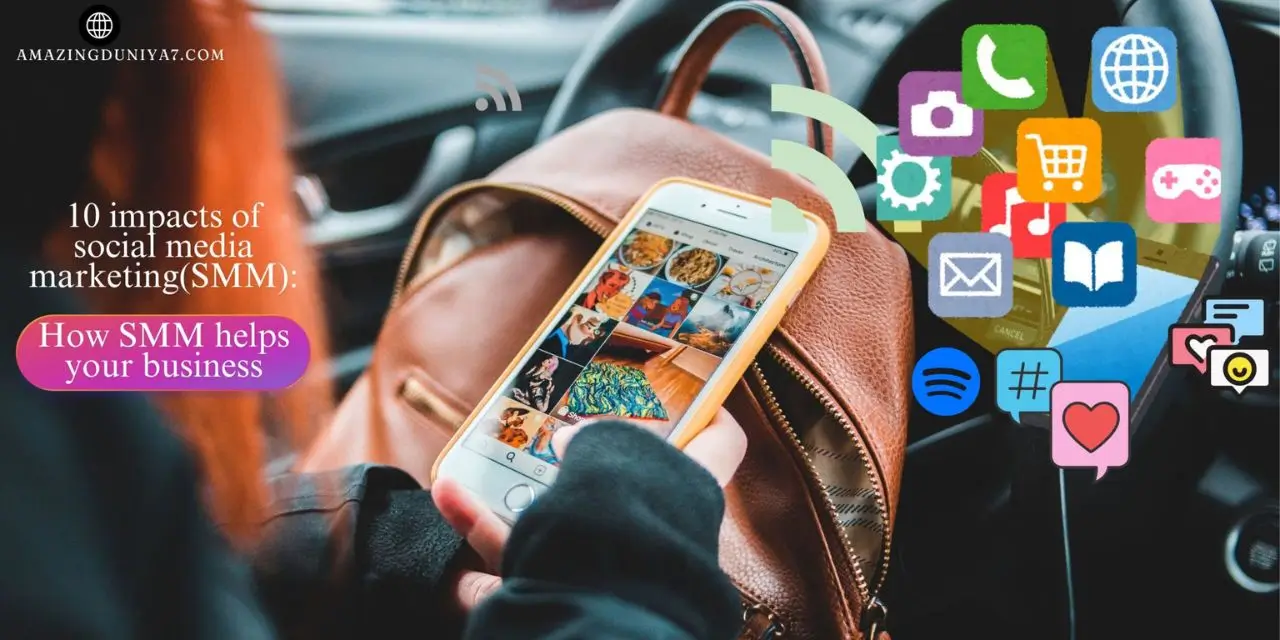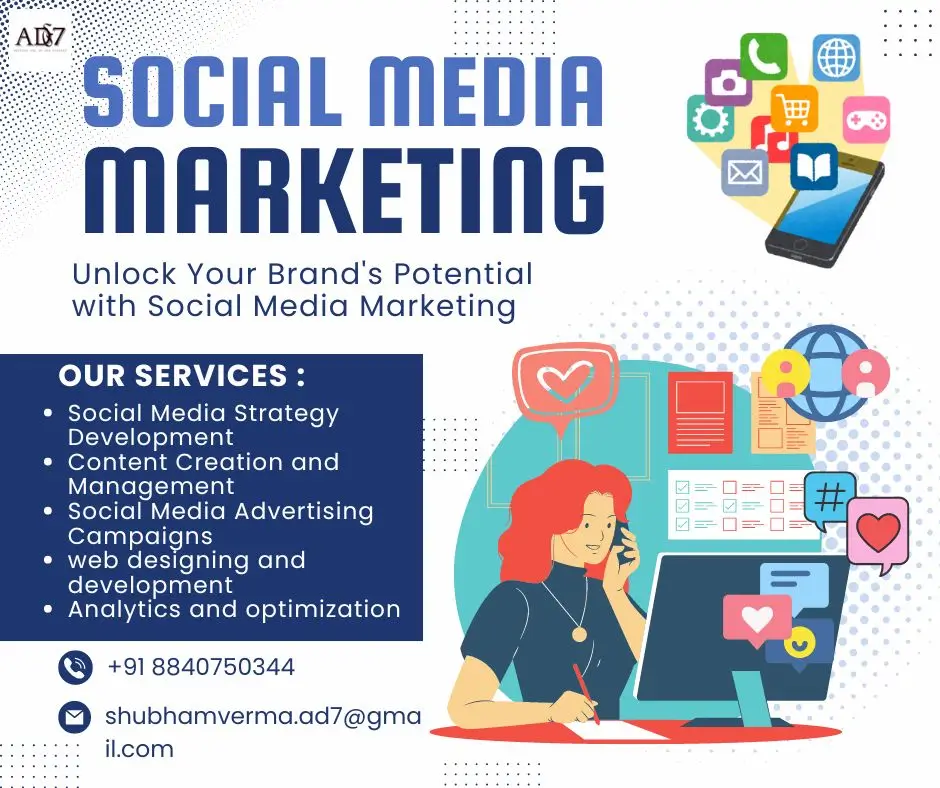Role of AI in Social Media Marketing (SMM)
Today Social media marketing is a big part of how businesses connect with their customers, and AI is playing an important role in that. AI tools can help analyze data, create content, and engage with users, making it easier for brands to reach their audience. In this blog, we’ll look at how AI is being used in social media marketing and explore some practical ways it can help you. With the right tools, you can save time and focus on what matters—building relationships with your customers. As you learn to use AI, you’ll find new opportunities to connect with your audience. From automating responses to personalizing content, AI can help you create a more engaging experience. Let’s take a closer look!
What is Social Media Marketing?
Social Media Marketing (SMM) is all about using social media platforms, like Facebook, Instagram, and Twitter, to promote your business or brand. Imagine you have a small business, and you want more people to know about it. Instead of just telling friends or putting up posters, you can reach thousands of people online by sharing posts, photos, and videos about what you offer. With new features and platforms emerging every day, social media marketing is constantly evolving.
While social media marketing is very important for growing your business, you might need to change your plan based on where your customers are spending their time online. Different social media platforms attract different people, so knowing where your customers are can help you connect with them better. Ultimately, Choosing the right platforms can really make a difference in how successful your marketing is.
Some Great Benefits of Using AI in Social Media Marketing
1. Creates Content:
Automated Posts
One of the biggest benefits of AI in social media marketing is that it can help you create content easily. These AI tools provide interesting posts having attractive graphics and related captions. The systems then study what kinds of content work best across platforms. This helps marketers create posts that resonate with an audience. Thus, time spent on content creation can then be devoted by marketers to strategy and audience engagement. For instance, tools like Lately and Copy.ai can draft social media posts based on guidelines or past successful posts. This means marketers can maintain a consistent posting schedule without sacrificing quality. Additionally, AI can suggest the best times to post, ensuring that content reaches the maximum number of users.
Content Curation
Content Curation involves finding and sharing articles, videos, and images that other people have created. Instead of always making your own content from scratch, you can look for helpful or interesting information that already exists. This way, you can provide your audience with valuable content that they’ll appreciate, without having to create everything yourself.
AI helps with this by quickly searching through a lot of online information to find relevant content for you. For example, if you’re looking for posts about a specific topic, AI can find those articles and videos for you. This way, you can keep your social media fresh and interesting without having to create all the content yourself.
2. Understands Your Audience: AI in Social Media Marketing (SMM) how it works
Data Analysis
Understanding your audience is really important for successful marketing. AI can look at a lot of data to find out what users like, how they behave, and who they are. This helps brands get a better idea of their audience and what matters to them, which leads to more focused and effective campaigns. AI tools can analyze things like social media interactions, website visits, and customer surveys. By looking at this data, marketers can spot patterns that give them a clearer picture of what their audience wants and needs.
Segmentation
AI helps marketers understand their audience better, allowing them to create very specific segments. This means they can focus on details like interests, behaviors, or demographics to group people together. When marketers send targeted messages, they connect more effectively with these groups. For example, a clothing brand might divide its audience by age, style preferences, and past purchases. By sending special promotions to these specific groups, the brand can see a big boost in sales and keep customers coming back. AI-driven segmentation helps avoid treating everyone the same, so brands can have more personal interactions with each group.
Why Understanding Your Audience Matters
When you know who you’re talking to, you can create content that grabs their attention and speaks to their needs. This makes your social media posts more engaging and relevant, which can lead to more likes, shares, and even sales.
Personalized Content: Knowing your audience allows you to create content that speaks directly to their needs and interests, making your message more effective.
Increased Engagement: When your posts resonate with your audience, they are more likely to like, comment, and share, leading to higher interaction rates.
Better Targeting: Understanding your audience helps you reach the right people with ads or promotions, ensuring your marketing budget is used efficiently.
Improved Customer Relationships: Engaging with your audience in a meaningful way builds trust and loyalty, leading to long-term relationships.
Higher Conversion Rates: When your content aligns with what your audience is looking for, they are more likely to take action, such as making a purchase or signing up
3. Personalization:
Dynamic Content
Personalization is really important in marketing today, and AI makes it very easy. By looking at user data, AI helps brands create content that changes based on what each person likes and how they act. This means two people can get totally different posts or recommendations from the same brand, making their experience better. For example, Netflix uses AI to suggest shows or movies based on what you’ve watched before. Brands can do the same thing for product recommendations or social media messages, so each interaction feels more personal and relevant.
Recommendation Engines
Recommendation engines are really useful for personalizing experiences with AI. They look at how users behave to suggested products or content. This makes the experience better for users and keeps them more engaged. For example, online shopping sites often show products that relate to what you’re currently looking at. By highlighting items that fit a user’s interests, brands can increase the chances of turning casual visitors into customers.
4. Social Listening and Sentiment Analysis:
Monitoring Brand Sentiment
Social media is full of opinions, and AI helps brands keep track of them. AI tools can monitor how often a brand is mentioned and whether those mentions are positive, negative, or neutral. This quick feedback lets brands respond promptly to issues and connect better with their audience. For example, tools like Brand Watch and Hootsuite use AI to show how customers feel about a brand. By understanding their feelings, a brand can address their concerns earlier and improve its image.
Trend Analysis
Besides tracking feelings, AI can spot new trends by looking at conversations on social media. This helps brands stay ahead by adjusting their strategies based on what’s popular right now. For example, if AI notices a sudden rise in talk about a specific product, brands can quickly create content related to that buzz. By keeping an eye on trends, marketers can make sure their messages are timely and interesting, which helps them get noticed and stay relevant.
5. Chatbots and Customer Service:
24/7 Support
AI-based chatbots are revolutionizing the way social media companies offer their customer care. This is because the chatbots can address queries and support users 24/7, thus providing an immediate response to customers’ queries. This measure of help would further facilitate the experience of users who’d then have to wait longer for people to assist them. For instance, many brands now use chatbots on platforms like Facebook Messenger to handle common customer queries. Whether it’s providing product information, helping with order tracking, or answering frequently asked questions, chatbots can efficiently manage these interactions, freeing up human agents to handle more complex issues.
Lead Generation
While chatbots are great for helping customers, they can also be a useful tool for finding new leads. When a chatbot chats with someone, it can ask the right questions to figure out what the user needs and guide them to the right resources or even a specific sales team. For instance, if someone is chatting on a brand’s social media page, the bot might ask what they’re interested in and then suggest a product or service based on their answer. This way, chatbots make it easier for brands to qualify leads, helping them identify potential customers who are really interested.
6. Ad Targeting and Optimization:
Predictive Analytics
Advertising really benefits from AI because it helps brands understand what works best. By analyzing user data, AI can show which groups of people are likely to respond to ads. This is important because it allows marketers to spend their money wisely and focus on those who are more likely to make a purchase. For example, , if AI finds a group that keeps engaging with a brand, marketers can spend more on ads for that group. This way, they make sure they’re getting good results from their campaigns.
A/B Testing
Furthermore, AI makes A/B testing easier – a comparison of two different ads to determine which one performs better. Traditionally, A/B testing would require a lot of time and resources, but AI automates the whole process. It can run multiple tests rapidly on different ad variations, from most effective messaging to visuals. For instance, with AI capabilities, the data collected on the performance of different adverts can be assessed and changed automatically concerning ad placement or content to garner maximum engagement. This will be an ongoing process of optimization that will allow brands to continuously improve their advertising techniques based on feedback in real time.
7. Performance Measurement:
Analytics Tools
Every marketing strategy requires tracking how effective social media campaigns are. AI analytics tools help marketers gain deep insights into campaign performance by tracking engagement, reach, and conversions. Data thus allows marketers to evaluate their strategies quickly and then make the necessary adjustments in real-time. For example, platforms like Google Analytics and Sprout Social offer comprehensive dashboards that visualize performance metrics, helping marketers understand what is working and what isn’t. By analyzing this data, brands can refine their strategies to drive better results.
Automated Reporting
The other advantage of AI in performance measurement is automatic reporting. The system will do the generation of reports This means you get all the important numbers and results in a way that’s easy to understand. It saves time and lets brands keep up with their marketing efforts. For example, an AI tool might make weekly reports that show how many people engaged with posts, which ones were the best, and how the audience is growing. With these reports, marketers can focus more on making their campaigns better.
8. Visual Recognition:
Image and Video Analysis
AI is also great for handling visual content. It can analyze images and videos to recognize brand logos, products, and even the feelings shown in pictures. This helps keep a brand safe by checking how it’s represented online and making sure it matches the brand’s values. For example, AI can look at a social media post to see if the brand’s logo is used correctly or if there are any negative comments related to the brand. This kind of monitoring helps maintain a good brand image online and protects companies from damage to their reputation.
User-Generated Content
AI also helps with managing user-generated content (UGC). Nowadays, many customers share their experiences online, and AI makes sure that this content is well-organized and shared in the best way. Good UGC can help a brand highlight positive experiences, which build community and authenticity. For example, AI can select the best customer photos or testimonials to post on social media. This not only boosts the brand’s credibility but also encourages more customers to share their own experiences.
Impact of AI in Social Media Marketing:
- (1) Saves Time: Since AI automates tasks like posting and responding to comments, you have more time to focus on other important things.
- (2) Improves Engagement: With AI’s help, you can create more targeted and personalized content, which attracts more likes, shares, and comments.
- (3) Boosts Efficiency: It helps you work smarter, not harder. AI gives you insights and suggestions that can boost your social media performance without guessing what might work.
In this way, AI makes social media marketing a lot easier. It helps you focus on what really matters and stay in touch with your audience without all the guesswork. Think of it like having a smart assistant that learns and gets better over time.
Need Help to Improve Your Website or Attract More Visitors
We are always ready!

If you are searching for someone who is expert in Web Designing and SEO components, then contact us, our team member will understand your requirement and provide you a detail solution to meet it.






